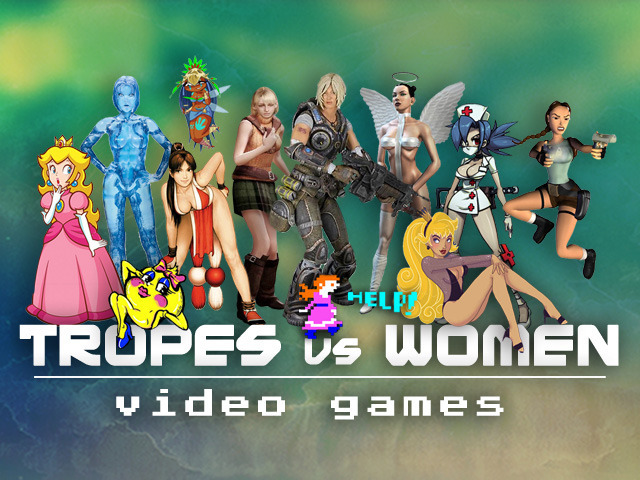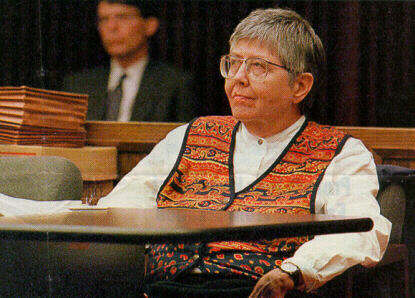Last updated on May 29, 2013
Have you seen these Tropes vs. Women videos? I’m not too big a fan of them (as you might suspect). Anita Sarkeesian says some good things (wow, don’t love violence against women), some alright things (media might be manipulative), and then some flat-out unfounded inferences on narrative tropes in video games (the subject of the present series).
Firstly, does it ever occur to anyone that, perhaps, our lives aren’t dictated by some patriarchal misogynist who set stereotypes in place long before we were born? I’m not sure why we always think that people develop ideas unconsciously. In some respects, yes, we do accept some assumptions. We always inherit a part of our cultural heritage, but we can choose to see it or accept it. This is a conscious choice in many respects, as I find myself doing constantly. I willingly reject many notions of modern culture, and accept those that fit within a Scriptural mindset. If it doesn’t, I throw it out. This goes for feminism’s modern militancy – I just don’t see the need for it.
Perhaps I am tainted by the influx of feminist theology I studied in graduate school. To explain: Feminist theology emphasizes the experiential element. As women’s experience is the measure, all problems stem from oppression of women. Thus, for example, the gendered nature of language is a patriarchal structuring mechanism to reinforce the subservient role of women in modern society. Religious stories that represent females as passive, weak, or merely caretakers serve as a method of oppression that utilizes religious authority to put women into their place, fearful that they might displace male dominance.
As such, the methodology of the feminist theologian starts with critiques of the past and its gendered assumptions, followed by the search for alternative Biblical and extra-biblical traditions that support feminist ideas. It is in this search that they can revise Christian categories to support and emphasize the role of women – at the expense of their male counterparts. Apparently, because men are emphasized through Scripture, it’s somehow fine to do it in reverse and in the most underhanded and non-conciliatory way possible.
And boy, are those feminist theologians ever crazy! Yep, a male commenting on women’s issues isn’t going to obtain much traction, but I’d rather focus on ideas rather than the preconceived notions of gender politics. Most feminists really focus on the idea of liberation and un-focused bomb-throwing at their perceived opposition. The anarchist tries to dismantle her culture without understanding what’s good and bad about it, inevitably throwing the baby out with the bathwater (to use a phrase that makes no sense to me at all).
It begins to make female eyes the exclusive domain of real interpretive force, and that’s not a good thing. The “oppressed”, so called, become the “oppressor”. The patriarch and the image of “male”, real or imagined, must be dismantled and destroyed – so that women can rule. Look up Mary Daly, and you’ll see what I mean. She argues that Christianity’s a patriarchal religion, and destroying it remains our only path to getting at “true” religion. Any true pursuit of egalitarian religion will not include, as its mode of operation, an “oppressive reversal” – that is, placing a new group in power who can just as easily perform the same oppressive function as the latter. I’d argue that has already happen through the increasing need to make male and female the same, which they clearly are not, both in Scripture and biology.
In fact, feminist ideologies represent a return to the earliest human societies. The intent is separation, conflict, and winning the war against one’s enemies, in this case the ideological oppressors and under the guise of academic scholarship. The goal for these groups is conquest, victory, and regnancy for their particular interest group to which all others should bow, not an equal society. They believe in a cosmic narrative, of their own founding, which places them as the victims on the “right” side of history, and all who oppose them as the oppressors. Eventually, the tide of history will turn their way and the oppressor will be vanquished. To take Mary Daly, well-respect academic feminist at her word, is to encounter something quite frightful:
…women under phalocentric rule are confined to the role of vessels/carriers, directed and controlled by men. Since that role is the basic base reversal of the very be-ing of Voyaging/Spiraling women, when we direct our own Crafts/Vessels we become reversers of that deadly reversal.
If life is to survive on this planet, there must be a decontamination of the Earth. I think this will be accompanied by an evolutionary process that will result in a drastic reduction of the population of males.
Anita Sarkeesian may not believe this, but making yourself a halfway house of ideas does not a consistent ideology make. Reforming male in female’s image (with such buzzwords as “sensitivity”) does not a good society make. New gender norms pop up yet again – it is inevitable. You swap the idol onto the pedestal, and think you won’t let the giant boulder out. Take the ideas to their logical conclusion; you don’t get to accept the parts you like at exclusion to the parts you don’t. I always find modern feminism has this inconsistency in it – some like men, some don’t, some have this strange construction to make them both revolutionary and/or conservative, but it all ends in the same revolutionary model. You don’t just get to criticize something and then propose an obvious solution.
Robert C. Neville notes of these revolutionary Christian theologies that most “…are themselves un-revolutionary modernist developments of European modern thought, the very thought against whose institutionalized culture the social revolutions are believed to have addressed.” In Neville’s thought, these “revolutionary” theologies rely on the Enlightenment idea of power and the idea of narrative. Mathematical physics had removed the concept of value from the world, framing the conversation in terms of “inertial forces” whereby objects continue their motion until deflected by another object in motion. Thus, the perception of human beings began anew from the same scientific, valueless point.
One could say that individual subjectivity is intentionally directed inertial will, conscious or not. If humans are just a bundle of interests, then the objects pushing in the opposite direction – in this case, the male/usually white oppressors – must be brought low, and the oppressed brought higher to counteract that imbalance. Thus does the narrative of power struggle reach its zenith in the idea of inevitable human and social progress – there’s no need for the oppressed to address their own sinfulness, just that of the oppressor. Hence, the reflective gives way to the active, the inner life suppressed by that of the need for constant action. My personal sings get stuffed way down deep; yours are the ones we should address, obviously.
That’s just theology, though. Modern feminism comes as a result of a particular development in the modern world. Sigmund Freud’s idea of psychoanalysis affects us more than you know, as “tropes” and “unsophisticated male power fantasies” become things we desire…without quite desiring them consciously. You know, subconscious desires and stuff like that? Our view of psychoanalysis appears more tradition and heresay than scientific examination. We adopt it as a cultural idea for human analysis, not the actual science – more like conjecture of actual scientific analysis. In a phrase: psychonanalysis became a fashion, a fad by which we hang our presuppositions and understanding of human consciousness. Fashions don’t need to adhere to reality; they merely need to appear like it. Hence, their effectiveness.
We make science into a test of life, and since when has this ever worked out well? We use psychoanalysis for, among other things, literary criticism. Do you think Shakespeare knew that was happening, or do his characters operate on a Christianized worldview of free agency and definite personality, not a bundle of inertial emotions? Our modern narratives follow this same line precisely because it is the fashion, even if not the reality. Our criticism also follows from this invisible starting point, made wholly visible by a cursory analysis (har har) of analysis as Chesterton gives (apologies to those not familiar with literary characters, though you can get the gist):
Before men analyze the uses of the unconscious mind, it may, perhaps, be well for them to discover the use of the mind; and before we come in this connection to any consideration of results, it may be well to say a word about methods. Now, the passages most eagerly quoted, from the thinkers most ardently admired, in this school of philosophy, are generally enough to show that whether or no they could theorize, they certainly could not think. One of them is admired and quoted for his theory of the character of Hamlet; according to which Hamlet not only hated his uncle (which even a mere literary critic, with no scientific training, might possibly be able to conjecture), but that he also secretly hated his father simply for loving his mother. I know not what one is expected to do with this sort of thing except laugh, unless it be urged that it is inhumane to laugh at lunatics.
The professor might just as well reconstruct the real, but rigidly concealed, character of Ariel, deducing it from the observed effects of hypnotism as probably practised by Sycorax. He might as well interpret the “Midsummer-Night’s Dream” by psychoanalyzing the dreams of Moth and Cobweb. Few of us, I fancy, wish to be entangled in such cobwebs. Most of us would be decidedly relieved if Puck, another promising subject for psychoanalysis, would come with his broom to sweep such dust, not to say dirt, behind the door…
The mark of this sort of psychoanalyst is that he is always talking about complexes, and seems never to have heard of complexity. The first thing to note about the movement as a whole is that it is one of a historic series of such movements, which may be called the insane simplifications. Each of them took not so much a halftruth as a hundredth part of a truth, and then offered it not merely as something, but as everything. Having never done anything except split hairs, it hangs the whole world on a single hair.
Seriously, you can find anything if you look hard enough for it. You must takes things as they are, rather than what you want them to be. Any kind of phrase, any passing speech you make could be construed by someone, somewhere, as offensive. A minor slip-up could imply an Oedipus complex. Clearly, that’s hilarious to me, as hilarious as the idea of Tropes like “Damsel in Distress” in video games. The use of effective storylines get used because, hey, they work. It’s amazing, I know! Such ideas place clear tropes against everyone – so I get to dismiss the actual workings of reality for my own vision, set apart from God’s vision. It’s a form of idolatry, at its base, a ruthless and cold logic that makes a lively world into a dead, singular similarity. The grand narrative infects us at every turn.
I can find any number of seeming unrelated things, and relate them to something else under a unified narrative structure (like Anita Sarkeesian’s analysis) – that doesn’t take effort. I should know: I’ve done it before, and it’s always easy once you reduce the world to your opinionated point of view. What takes effort is to make it reflect reality. Christians should strive for this, not making our notions of egalitarianism or feminism or whatever get inserted into the Christian faith. In other words, Scripture is normative, not what I want.
For tomorrow…



